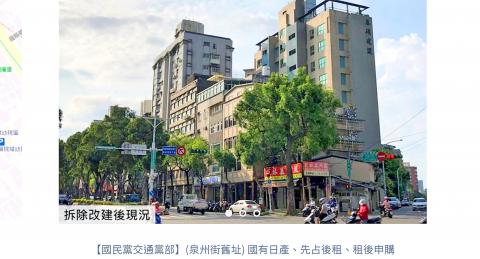The Chinese Nationalist Party (KMT) squatted on a piece of public property in Taipei’s Zhongshan District (中山), before acquiring and later selling it for profit, the Ill-gotten Party Assets Settlement Committee said yesterday.
Citing its investigation, the committee said the property at 6 Quanzhou St, which now houses a 12-story condominium, was seized in 1945 by the Republic of China government from Heihachiro Ishikuro, a Japanese citizen.
The KMT Department of Nautical Enterprises and Sailors began occupying the property illegally in 1950, and in 1957, the party reached an agreement to start paying rent to state-owned Land Bank of Taiwan, which managed properties and enterprises seized from Japan, although it only paid the rent for the first three months of 1957, the committee said.

Photo courtesy of the Ill-Gotten Party Assets Settlement Committee
The bank told the KMT that it would “reluctantly allow” the KMT to pay the debt of NT$49,390 (US$1,572 at the current exchange rate) in installments as condition for continuing the lease, the committee said.
The KMT refused to pay the installments, saying that there were cash flow problems with department and it could not guarantee that the department would meet its obligations, the committee said.
After the bank threatened to sue to evict the KMT and foreclose on the property, the KMT finally agreed to make provide a guarantee via its then-Finance Committee chairman Hsu Po-yuan (徐伯園), paying the rent arrears in installments of NT$3,000 over 17 months in 1961 and 1962, the committee said.
The KMT in 1971 bought the land and the structure for NT$2.58 million, and in a series of transactions between 1999 and 2002, sold them to a third party for an undisclosed sum, it said.

The High Prosecutors’ Office yesterday withdrew an appeal against the acquittal of a former bank manager 22 years after his death, marking Taiwan’s first instance of prosecutors rendering posthumous justice to a wrongfully convicted defendant. Chu Ching-en (諸慶恩) — formerly a manager at the Taipei branch of BNP Paribas — was in 1999 accused by Weng Mao-chung (翁茂鍾), then-president of Chia Her Industrial Co, of forging a request for a fixed deposit of US$10 million by I-Hwa Industrial Co, a subsidiary of Chia Her, which was used as collateral. Chu was ruled not guilty in the first trial, but was found guilty

DEADLOCK: As the commission is unable to forum a quorum to review license renewal applications, the channel operators are not at fault and can air past their license date The National Communications Commission (NCC) yesterday said that the Public Television Service (PTS) and 36 other television and radio broadcasters could continue airing, despite the commission’s inability to meet a quorum to review their license renewal applications. The licenses of PTS and the other channels are set to expire between this month and June. The National Communications Commission Organization Act (國家通訊傳播委員會組織法) stipulates that the commission must meet the mandated quorum of four to hold a valid meeting. The seven-member commission currently has only three commissioners. “We have informed the channel operators of the progress we have made in reviewing their license renewal applications, and

‘DENIAL DEFENSE’: The US would increase its military presence with uncrewed ships, and submarines, while boosting defense in the Indo-Pacific, a Pete Hegseth memo said The US is reorienting its military strategy to focus primarily on deterring a potential Chinese invasion of Taiwan, a memo signed by US Secretary of Defense Pete Hegseth showed. The memo also called on Taiwan to increase its defense spending. The document, known as the “Interim National Defense Strategic Guidance,” was distributed this month and detailed the national defense plans of US President Donald Trump’s administration, an article in the Washington Post said on Saturday. It outlines how the US can prepare for a potential war with China and defend itself from threats in the “near abroad,” including Greenland and the Panama

Taiwan People’s Party (TPP) Chairman Huang Kuo-chang (黃國昌) yesterday appealed to the authorities to release former Taipei mayor Ko Wen-je (柯文哲) from pretrial detention amid conflicting reports about his health. The TPP at a news conference on Thursday said that Ko should be released to a hospital for treatment, adding that he has blood in his urine and had spells of pain and nausea followed by vomiting over the past three months. Hsieh Yen-yau (謝炎堯), a retired professor of internal medicine and Ko’s former teacher, said that Ko’s symptoms aligned with gallstones, kidney inflammation and potentially dangerous heart conditions. Ko, charged with